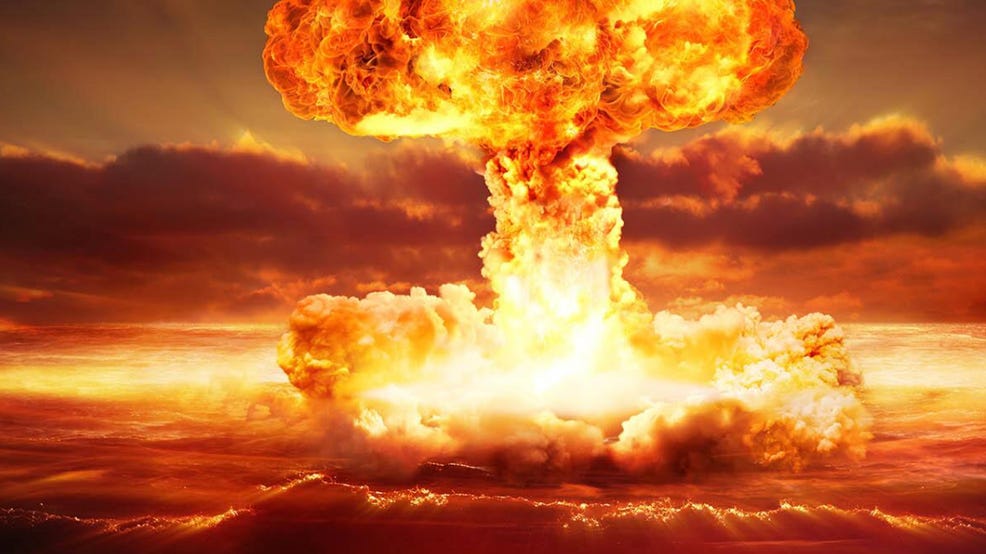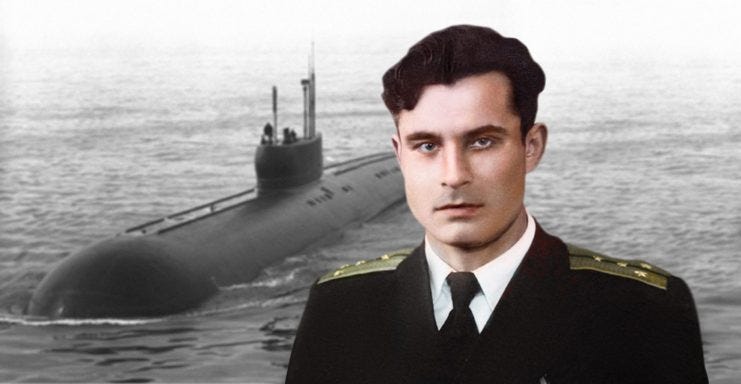THE REAL RISKS OF ARMAGEDDON
What Should—and Shouldn’t—Concern Us About Nuclear War Over Ukraine
From the start, the Ukraine War has unfolded in the shadow of Armageddon. Before the invasion, President Biden said that if Russia attacked one inch of territory in a NATO country, it would be “World War III.” After the invasion began, he noted that it was too risky to impose a no-fly zone, which could lead to direct air combat between the United States and Russia that might escalate in terrifying ways. Meanwhile, the U.S. government began engaging in contingency planning for what to do if Putin uses tactical nuclear weapons—perhaps detonating a nuke in the North Sea as a warning. And on Saturday, much of the global commentariat argued that Biden’s ad lib about throwing Putin out of power was provocative and dangerous.
I’d argue that we are simultaneously over-reacting and under-reacting to the possibility of World War III.
So how should all of this affect our thinking about the worst Cold War confrontation since the 1962 Cuban Missile Crisis? I’d argue that we are simultaneously over-reacting and under-reacting to the possibility of World War III. But before telling you what I mean, let’s be clear about one thing: We are much further away from a world war with Biden as president than if the invasion had happened when Donald Trump was in office.
Of course, Trump is now saying that Putin would never have invaded if he was president. This sounds plausible on the surface but isn’t, as Trump’s former national security adviser, John Bolton, has recently explained. Bolton recalls that Putin didn’t think his military was ready to roll in 2019 (it still isn’t) and then Covid hit, which delayed his plans until after the 2020 election. But Bolton also suggests that Putin was waiting for a second Trump term, when the U.S. president—who never liked NATO—would have looked the other way. “If Trump had been re-elected, Putin would be in Kyiv already,” Bolton said.
Trump himself lends credence to that, and not just because he described the invasion at first as “genius” and “savvy.” Imagine him taking that view as president. The West would never have united as it has against Putin and provided a significant level of military assistance to Ukraine. The Russian army would by now be digesting Ukraine and on its way to swallowing Moldavia with confrontation with a weak and divided NATO—and possible general war in Europe—still on the menu.
But Bolton also suggests that Putin was waiting for a second Trump term, when the U.S. president—who never liked NATO—would have looked the other way. “If Trump had been re-elected, Putin would be in Kyiv already.”
Anyone thick enough to think Trump would have stood up to Putin should consider the 2018 Helsinki conference, where Trump said he trusted Putin more than U.S. intelligence on the question of whether Russia intervened in the 2016 election. (It did, according to the Mueller Report). Because aides from both sides were barred from his meeting there with Putin, we’ll likely never know exactly what they said to each other. But we have a pretty good idea, thanks to Trump’s own 2022 comments on conservative talk radio:
“I knew that he always wanted Ukraine. I used to talk to him about it. I said, ‘You can’t do it. You’re not gonna do it,’” Trump told the Clay Travis and Buck Sexton Show. “But I could see that he wanted it. We used to talk about it at length.”
Let’s unpack this for a second. The President of the United States did not say: “Vladimir, if you do that, the minor sanctions we’ve imposed already will look like nothing. The West will rise up as one against you and arm Ukraine to the teeth for a guerrilla war. Russia will become a pariah nation.” Anything less than that was a green light to invade.
If Putin had done so when Trump was the American president, he would have exploited a divided NATO and an easily demoralized Ukraine. Instead, the alliance is guided by an experienced and committed democratic leader who has helped bring the greatest unity to NATO since at least the 1960s. To say that makes us safer is to state the obvious.
But didn’t Biden screw up royally by ad-libbing at the end of Saturday’s speech?
“For God’s sake, this man cannot remain in power.”
Biden overshadowed a tough-minded, eloquent address and raised fears that the U.S. was now advocating regime change. Afterwards, the State Department made a game effort to clean up what Aaron David Miller called “a gaffe from the heart,” claiming implausibly that Biden was not referring to “exercising power in Russia.”
Based on a long record of Biden slips of the tongue, there was nothing intentional about the comment. The Russians know this, which is why the gaffe was not especially harmful.
I’d argue that the most interesting part of the incident was Russia’s reaction. Instead of responding with a fierce denunciation of Biden, escalating already-high tensions, the Kremlin spokesman Dmitry Peskov mildly told state news agencies, “That’s not for Biden to decide. The president of Russia is elected by Russians.” This reminds me of when Putin said publicly that he favored Trump in 2020. It was pointed out that he didn’t get to vote in the U.S.—thank God.
The net effect of the whole episode is not to take the world closer to nuclear war, as the pearl clutchers in both parties are claiming. Biden had already called Putin a “killer” and “butcher”; this was only a slight rhetorical escalation from what he has been saying for a month. It hardly makes it harder for Putin to find an off-ramp in Ukraine if he feels that—with his army in trouble—it’s in his interest to do so.
The net effect of the whole episode is not to take the world closer to nuclear war, as the pearl clutchers in both parties are claiming. Biden had already called Putin a “killer” and “butcher”; this was only a slight rhetorical escalation from what he has been saying for a month.
In fact, in combination with a hardline speech, Biden’s spontaneous line may have been at least marginally helpful in increasing the diplomatic pressure on him. Strength is the only language that Putin understands. He’s either on offense or defense and it’s the latter where we want him, defending against deadly Ukrainian counter attacks in the field and an enraged American president in the diplomatic realm. In that context, Biden’s ad lib doesn't commit the U.S. to regime change or raise the danger of nuclear war; it does shove the tyrant back on his heels, where he belongs.
So if the world is over-estimating the risks of rhetoric, where is it underestimating the risk of a nuclear exchange?
The answer is that the chances of accidental nuclear war are much higher than they were a month ago.
Over the last 60 years, the world has experienced a few close calls that the public didn’t learn about until much later:
In 1962, during the Cuban Missile Crisis, an American destroyer dropped depth charges just above a nuclear-armed B-59 Soviet submarine submerged near the tense naval blockade in the Caribbean. The captain—out of contact with Moscow— thought World War III had begun and prepared to launch a nuclear missile toward Florida. Fortunately, Vasili Arkhipov, B-59’s second in command but an admiral with authority, disagreed and the sub held its fire pending orders from Moscow that of course never came. Arkhipov saved the world but still hasn’t gotten his full due.
In 1979, Zbigniew Brzezinski, national security adviser in Jimmy Carter’s White House, received a call at 4:00 a.m. saying that dozens of Soviet nuclear missiles were headed toward the continental United States. After a second call about the attack, Brzezinski was just about to awaken President Carter when a third call informed him that it was a false alarm. A technician at Colorado’s NORAD command post had accidentally inserted a training program into the computer. Carter and Soviet Premier Leonid Brezhnev later exchanged polite letters about the seriousness of the matter.
In 1983, a Soviet monitoring station misidentified glints of sunlight off clouds above Montana as five ICBMs headed toward Moscow. While protocol demanded the incident be immediately reported, Lt. Colonel Stanislav Petrov—with only minutes to spare—ignored the blaring alarms and reported the launch as a glitch.
Fast forward to today, the trust required for convincing the other side that it’s a false alarm is absent now.
This—not telling Vladimir Putin that we really don’t like him—is what most concerns nuclear experts today. We’re one accident away from oblivion.









Jon, brilliant piece of journalism. Are there "sources" for your two SOVIET HEROs, Please advise. MEANTIME, THIS PIECE FROM THE ORIGINAL OLD GOAT, J. Alter, is better, or certainly as good, as words from the other "old goats". Grateful to support your superb journalism--Barry Jagoda
Does anyone from the 50s and 60s remember "On the Beach", "Fail-Safe", "Dr. Strangelove", or "Seven Days in May"? These disturbing novels and/or films imagine the immediate onset or aftermath of nuclear war, and the tick-tock machinations of an American coup d'etat originating in the Pentagon. Even as they are dramatic, they are mere primers for the comprehension of geopolitical shenanigans in U.S.-Russia relations during the Trump/Putin/Zelensky/Biden era.
Yes, Jon, we thank our lucky stars for President Joe Biden.